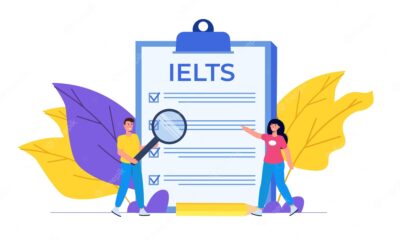Career Tips
Top Reading Tips To Help You Pass IELTS

The International English Language Testing System (IELTS) is a globally recognized English language competency test that is accepted by over 11,000 organizations in 140 countries. It is used to assess non-native speakers’ English language abilities for objectives such as education, employment, and immigration.
The IELTS reading test assesses your ability to read and comprehend many types of writing such as news, school papers, and advertisements. You are given a score between 0 and 9, with 9 being the highest. To do well, you must be able to read quickly, comprehend main ideas, and locate precise information.
It is critical to have a thorough comprehension of the English language as well as the ability to read swiftly and efficiently in order to succeed in the IELTS reading test. It is also critical to be familiar with and rehearse the various types of questions that may be asked.
Here are the best Reading Tips That Can Help You Pass IELTS:
These tips will help you improve your reading skills, develop strategies for answering questions, and help you increase your band score:
1.Familiarize yourself with the IELTS reading test format:
It is critical to understand the IELTS reading test format before taking the test. This entails comprehending the types of questions and time limits for each section. More information on the IELTS reading exam format can be found on the official IELTS website.
2. Develop Skills For Each Question Type:
The IELTS reading section contains 14 different question types, each designed to measure different reading abilities. To effectively answer each question type, unique skills and tactics appropriate to the types are required.
Answering these questions demands a thorough comprehension of each category, as well as the capacity to recognize keywords, synonyms, and paraphrased information.
3. Skimming:
Skimming is a reading technique that involves reading quickly to gain a general understanding of the text. This can be useful when answering questions concerning the major theme of a passage.
To get the important points, read the passage in 2 to 3 minutes. When skimming, start with the first paragraph, pay attention to the first sentences for the main idea, and examine the last paragraph for a summary. It’s a good idea to highlight the keywords as you go.
4. Scanning:
Scanning means reading quickly to find specific information, such as facts, technical terms, or jargon. When dealing with a reading passage, use scanning to locate crucial details like dates, names, numbers, and new terms. To scan, let your eyes (or your finger) move swiftly through the text.
5. Improve Your Reading Comprehension:
Being able to read fast and effectively is one of the keys to success in the IELTS reading test. Because you only have 60 minutes, it is critical that you improve your speed reading skills and identify answers rapidly. Set a timer and limit your reading to three words at a time to develop the habit of reading quicker. Speed-read numerous English texts, such as periodicals, newspapers, and handbooks.
6. Distinguish and Identify Keywords:
To find keywords, read the introduction, main paragraph , and conclusion carefully. This serves as your proof. To determine the precise placement of keywords, recognize key terms, and determine whether they may be rephrased.
Compare these to the options provided (rewritten replies). Instead of guessing, underline that rephrased sentence once you’ve identified the correct one. Finally, write the question number on top of the line that answers it.
7. Understand the context:
When reading a paragraph, re-read and rephrase it in your own words. It helps you to focus on the ideas and context instead of words. This approach is useful for the Reading test (General Training) that features three sections.
Each section has two or three factual texts (short texts) and slightly longer texts on a generic topic, work-related issues.Do not forget that the answers which you’re looking for are paraphrased.
8. Improve Your Reading Vocabulary:
Enhancing your vocabulary for IELTS reading gets you closer to your goal score. It is not just about understanding a word’s meaning but also knowing when and how to use it.
Additionally, understanding word collocations, such as which verbs pair with nouns, is important. Make use of a dictionary or thesaurus to support your learning and also be mindful of correct spellings when copying from the passage.
9. Practice and Read Different English Text:
Reading various English texts can help you improve your English.
Newspapers, magazines, journals, business letters, press announcements, and company reports are among the English writings available.
Consider reading novels and books for longer literary genres. If you’re bored, you can periodically listen to broadcasts from sources such as the BBC and CNN to learn about sentence structures, word usage, and synonyms.
10. Learn how to guess words:
You will not be able to know the meaning of every word that you encounter in the IELTS reading test. However, there are a number of strategies that you can use to guess the meaning of words, such as using context clues and looking for prefixes, suffixes, and root words.
11. Maintain Retention Without Sacrificing Speed:
To balance retention and speed during reading, use the six question words: Who? What? Why? How? When? Where? Apply these questions to each chapter or paragraph.
Alternatively, ask yourself: What do I want from this chapter/paragraph/book? This simple approach helps you easily identify valuable information while going through the passage.
12. Time Management Skills:
Effective time management is essential in IELTS Reading, regardless of whether you take the Academic or General Training style. With three portions, 40 questions, and a 60-minute time limit, give each segment about 20 minutes, with the final 5 minutes for review.
To manage time efficiently, opt for reading passages ranging from 700 to 1000 words. Take notes on keywords, and main ideas, and summarize your answers to stay organized.
13. Point Out Your Weakness:
Identify your weaknesses while studying for the IELTS reading test. Misunderstanding sections, searching for unrelated keywords, reading slowly, or adopting inefficient approaches and strategies are examples.
Once you’ve identified your weak points, work on improving your English language skills one at a time.
Takeaways
By following these tips, you can develop the skills you need to succeed in the IELTS Reading test. Remember, consistent practice and strategic preparation are keys to passing your IELTS exam.












